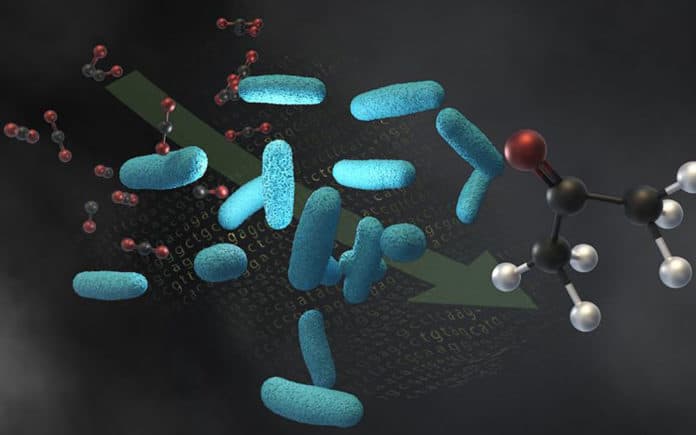Many industrial chemicals that are produced from fossil resources could be manufactured more sustainably through fermentation. A team of researchers from LanzaTech, Northwestern University, and the Department of Energy’s Oak Ridge National Laboratory has developed a new carbon capture technology that harnesses emissions to make valuable industrial chemicals.
The carbon-negative platform uses microorganisms as tiny but powerful factories that convert waste carbon dioxide (CO2) into acetone and isopropanol (IPA). These widely used chemicals serve as the basis of thousands of products, from fuels and solvents to acrylic glass (polymethyl methacrylate) and polypropylene.
The new process converts waste gases, such as emissions from heavy industry or syngas generated from biomass, into useful chemicals using an engineered bacterium called Clostridium autoethanogenum, or C. auto. The new gas fermentation process removes greenhouse gases from the atmosphere and also avoids traditional methods that use fossil fuel to generate acetone and IPA.
After performing life-cycle analysis, the researchers found that their carbon-negative platform could reduce greenhouse gas emissions by 160% as compared to conventional processes if widely adopted.
“The accelerating climate crisis, combined with rapid population growth, pose some of the most urgent challenges to humankind, all linked to the unabated release and accumulation of CO2 across the entire biosphere,” said Northwestern’s Michael Jewett, co-senior author of the study. “By harnessing our capacity to partner with biology to make what is needed, where and when it is needed, on a sustainable and renewable basis, we can begin to take advantage of the available CO2 to transform the bioeconomy.”
The research team believes that the developed strains and fermentation process will translate to an industrial scale. The approach also could potentially be applied to create streamlined processes for generating other valuable chemicals.
“This discovery is a major step forward in avoiding a climate catastrophe,” said Jennifer Holmgren, LanzaTech CEO. “Today, most of our commodity chemicals are derived exclusively from new fossil resources such as oil, natural gas, or coal. Acetone and IPA are two examples with a combined global market of $10 billion. The acetone and IPA pathways developed will accelerate the development of other new products by closing the carbon cycle for their use in multiple industries.”
